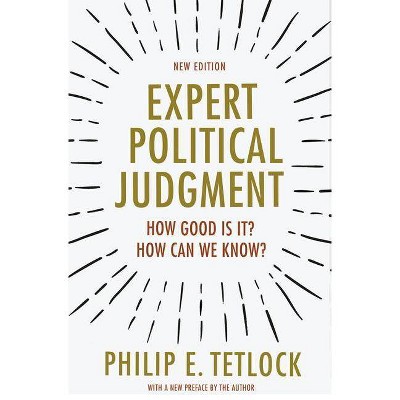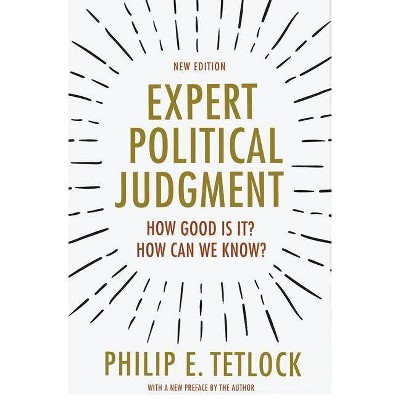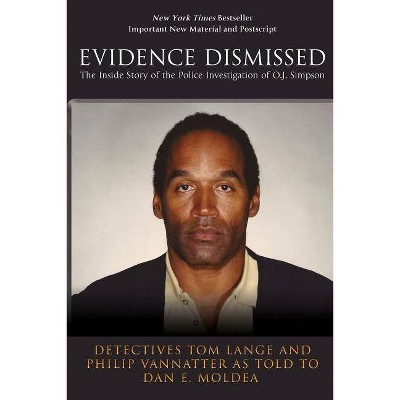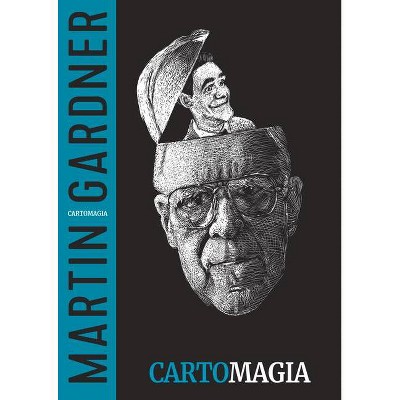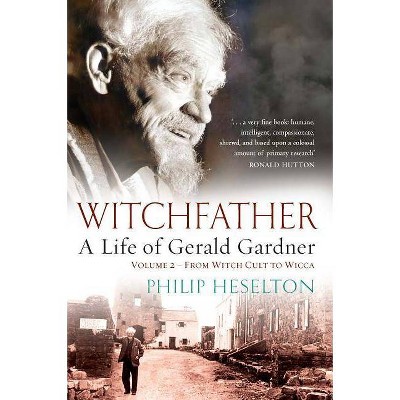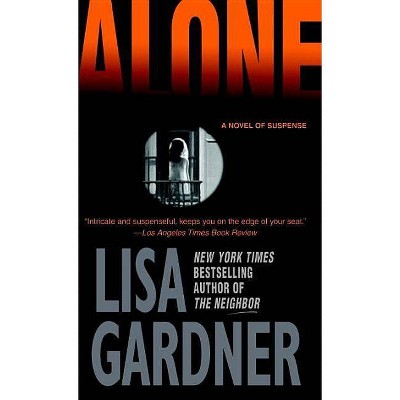Superforecasting - by Philip E Tetlock & Dan Gardner (Paperback)
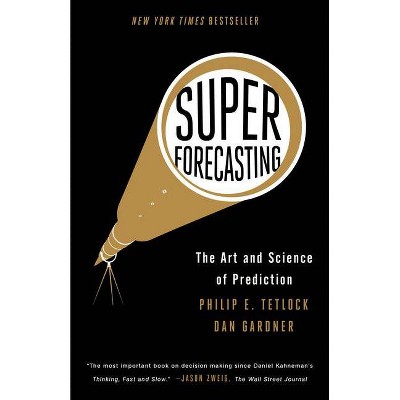
Similar Products
Products of same category from the store
AllProduct info
<p/><br></br><p><b> About the Book </b></p></br></br>"From one of the world's most highly regarded social scientists, a transformative book on the habits of mind that lead to the best predictions. Everyone would benefit from seeing further into the future, whether buying stocks, crafting policy, launching a new product, or simply planning the week's meals. Unfortunately, people tend to be terrible forecasters. As Wharton professor Philip Tetlock showed in a landmark 2005 study, even experts' predictions are only slightly better than chance. However, an important and underreported conclusion of that study was that some experts do have real foresight, and Tetlock has spent the past decade trying to figure out why. What makes some people so good? And can this talent be taught? In Superforecasting, Tetlock and coauthor Dan Gardner offer a masterwork on prediction, drawing on decades of research and the results of a massive, government-funded forecasting tournament. The Good Judgment Project involves tens of thousands of ordinary people--including a Brooklyn filmmaker, a retired pipe installer, and a former ballroom dancer--who set out to forecast global events. Some of the volunteers have turned out to be astonishingly good. They've beaten other benchmarks, competitors, and prediction markets. They've even beaten the collective judgment of intelligence analysts with access to classified information. They are "superforecasters." In this groundbreaking and accessible book, Tetlock and Gardner show us how we can learn from this elite group. Weaving together stories of forecasting successes (the raid on Osama bin Laden's compound) and failures (the Bay of Pigs) and interviews with a range of high-level decision makers, from David Petraeus to Robert Rubin, they show that good forecasting doesn't require powerful computers or arcane methods. It involves gathering evidence from a variety of sources, thinking probabilistically, working in teams, keeping score, and being willing to admit error and change course. Superforecasting offers the first demonstrably effective way to improve our ability to predict the future--whether in business, finance, politics, international affairs, or daily life--and is destined to become a modern classic"--<p/><br></br><p><b> Book Synopsis </b></p></br></br><b><i>NEW YORK TIMES </i>BESTSELLER - NAMED ONE OF THE BEST BOOKS OF THE YEAR BY <i>THE ECONOMIST </i></b> <p/><b><b>"</b>The most important book on decision making since Daniel Kahneman's <i>Thinking, Fast and Slow</i>.<b>"</b>--Jason Zweig, <i>The Wall Street Journal</i></b> <p/> Everyone would benefit from seeing further into the future, whether buying stocks, crafting policy, launching a new product, or simply planning the week's meals. Unfortunately, people tend to be terrible forecasters. As Wharton professor Philip Tetlock showed in a landmark 2005 study, even experts' predictions are only slightly better than chance. However, an important and underreported conclusion of that study was that some experts do have real foresight, and Tetlock has spent the past decade trying to figure out why. What makes some people so good? And can this talent be taught? <p/> In <i>Superforecasting</i>, Tetlock and coauthor Dan Gardner offer a masterwork on prediction, drawing on decades of research and the results of a massive, government-funded forecasting tournament. The Good Judgment Project involves tens of thousands of ordinary people--including a Brooklyn filmmaker, a retired pipe installer, and a former ballroom dancer--who set out to forecast global events. Some of the volunteers have turned out to be astonishingly good. They've beaten other benchmarks, competitors, and prediction markets. They've even beaten the collective judgment of intelligence analysts with access to classified information. They are superforecasters. <p/> In this groundbreaking and accessible book, Tetlock and Gardner show us how we can learn from this elite group. Weaving together stories of forecasting successes (the raid on Osama bin Laden's compound) and failures (the Bay of Pigs) and interviews with a range of high-level decision makers, from David Petraeus to Robert Rubin, they show that good forecasting doesn't require powerful computers or arcane methods. It involves gathering evidence from a variety of sources, thinking probabilistically, working in teams, keeping score, and being willing to admit error and change course. <p/><i>Superforecasting</i> offers the first demonstrably effective way to improve our ability to predict the future--whether in business, finance, politics, international affairs, or daily life--and is destined to become a modern classic.<p/><br></br><p><b> Review Quotes </b></p></br></br><br><b>A <i>New York Times </i>Editors' Choice<br>A <i>Washington Post </i>Bestseller<br>A Hudson Booksellers Best Business Interest Book of 2015<br>Longlisted for the Financial Times and McKinsey Business Book of the Year Award<br>Winner of the Axiom Business Book Award in Business Theory (Gold Medal) <p/></b>"A top choice [for best book of 2015] among the world's biggest names in finance and economics... Eurasia Group founder Ian Bremmer, Deutsche Bank Chief U.S. Economist Joe LaVorgna, and Citigroup Vice Chairman Peter Orszag were among those giving it a thumbs-up."<b><br>--<b><i>Bloomberg Business</i></b></b> <p/>"The material in <i>Superforecasting</i> is new, and includes a compendium of best practices for prediction... The accuracy that ordinary people regularly attained through their meticulous application did amaze me... [It offers] us all an opportunity to understand and react more intelligently to the confusing world around us."<br>--<i><b>New York Times Book Review</b></i> <p/>Tetlock's thesis is that politics and human affairs are not inscrutable mysteries. Instead, they are a bit like weather forecasting, where short-term predictions are possible and reasonably accurate... The techniques and habits of mind set out in this book are a gift to anyone who has to think about what the future might bring. In other words, to everyone.<br>--<i><b>The Economist <p/></b></i>Tetlock's work is fascinating and important, and he and Gardner have written it up here with verve.<br>--<i><b>The Financial Times <p/></b></i>"<i>Superforecasting</i> is the most important scientific study I've ever read on prediction." <br>--<b>Cass R. Sunstein</b><i><b>, The Bloomberg View <p/></b></i>Just as modern medicine began when a farsighted few began to collect data and keep track of outcomes, to trust objective 'scoring' over their own intuitions, it's time now for similar demands to be made of the experts who lead public opinion. It's time for evidence-based forecasting.<br><i><b>--The Washington Post <p/></b></i><i><i>Superforecasting</i></i>, by Philip Tetlock and Dan Gardner, is one of the most interesting business and finance books published in 2015." <i><b><br>--</b></i><b>John Kay, </b><i><b> The Financial Times <p/></b></i>One of Tetlock's key points is that these aren't innate skills: they can be both taught and learned... Tetlock's 'Ten Commandments For Aspiring Superforecasters' should probably have a place of honor in most business meeting rooms.<br>--<i><b>Forbes <p/></b></i>The key to becoming a better forecaster, if not a super one, according to Tetlock is the same as any other endeavor: practice, practice, practice.<i><b><br>--<i><b>The Street <p/></b></i></b></i>In this captivating book, Tetlock argues that success is all about the approach: foresight is not a gift but rather a product of a particular way of thinking... In each chapter, the author augments his research with compelling interviews, anecdotes, and historical context, using accessible real-world examples to frame what could otherwise be dense subject matter. His writing is so engaging and his argument so tantalizing, readers will quickly be drawn into the challenge - in the appendix, the author provides a concise training manual to do just that. A must-read field guide for the intellectually curious.<i><b><i><b><b><br></b>--<i><b>Kirkus Reviews</b></i>, </b></i></b></i>starred<i><b> <p/></b></i>Tetlock and Gardner believe anyone can improve their forecasting ability by learning from the way they work. If that's true, people in business and finance who make an effort to do so have a lot to gain -- and those who don't, much to lose.<br>--<i><b>The Financial Post <p/></b></i><i>Superforecasting </i>is a very good book. In fact it is essential reading -- which I have never said in any of my previous <i>MT</i> reviews... It should be on every manager's and investor's reading list around the topics du jour of decision-making, prediction and behavioural economics.<br>--<i><b>Management Today <p/></b></i>I've been hard on social science, even suggesting that 'social science' is an oxymoron. I noted, however, that social science has enormous potential, especially when it combines 'rigorous empiricism with a resistance to absolute answers.' The work of Philip Tetlock possesses these qualities.<br>--<i><b>Scientific American <p/></b></i>One of the best books I've read this year... <i>Superforecasting </i>is a must read book.<br>--<i><b>Seeking Alpha</b></i> <p/>Keen to show that not all forecasting is a flop, Tetlock has conducted a new experiment that shows how you can make good forecasts, ones that routinely improve on predictions made by even the most well-informed expert. The book is full of excellent advice -- it is the best thing I have read on predictions, which is a subject I am keen on... Gardner has turned the research into readable examples and a flowing text, without losing rigour... This book shows that you can be better at forecasting.<br>--<i><b>The Times of London</b></i><br><i><b><br></b></i>We now expect every medicine to be tested before it is used. We ought to expect that everybody who aspires to high office is trained to understand why they are so likely to make mistakes forecasting complex events... Politics is harder than physics but Tetlock has shown that it doesn't have to be like astrology.<br>--<i><b>The Spectator</b></i> <p/>"Philip Tetlock is the world expert on a vital subject. <i>Superforecasting </i>is the wonderful story of how he and his research team got ordinary people to beat experts in a very serious game. It is also a manual for thinking clearly in an uncertain world. Read it." <br> --<b>Daniel Kahneman</b>, winner of the Nobel Prize and author of <i>Thinking, Fast and Slow <p/></i>"<i>Superforecasting</i> is a rare book that will make you smarter and wiser. One of the giants of behavioral science reveals how to improve at predicting the future."<i><br></i>--<b>Adam Grant</b>, <i>New York Times</i> bestselling author of <i>Originals </i><br> <i> </i><br> "The best way to know if an idea is right is to see if it predicts the future. But which ideas, which methods, which people have a track record of non-obvious predictions vindicated by the course of events? The answers will surprise you, and they have radical implications for politics, policy, journalism, education, and even epistemology--how we can best gain knowledge about the world. The casual style of <i>Superforecasting </i>belies the profundity of its message."<br> --<b>Steven Pinker</b>, Johnstone Professor of Psychology, Harvard University, and author of <i>The Better Angels of Our Nature <p/></i>"Philip Tetlock's <i>Superforecasting</i> is a common-sense guide to thinking about decision-making and the future by a man who knows this terrain like no one else."<br>--<b>Ian Bremmer</b>, <i> <b><i>Bloomberg Business' </i></b></i><b>Best Books of 2015</b><i><br></i><br> "In this accessible and lively book, Tetlock and Gardner recognize the centrality of probabilistic thinking to sound forecasting. Whether you are a policymaker or anyone else who wants to approach decisions with great rigor, <i>Superforecasting</i> will serve as a highly useful guide." <br> --<b>Robert E. Rubin</b>, Former U.S. Treasury Secretary<br> <i> </i><br> "How well can we predict the future, really? There is no better way to answer that question than to read this book. You will come away disillusioned about the ability of experts, but also enlightened about how the best forecasters do it--and maybe even hopeful about your own prospects."<br> --<b>Tyler Cowen</b>, Director of the George Mason University Mercatus Center and author of <i>Average Is Over</i> <p/> "For thousands of years, people have listened to those who foretold the future with confidence and little accountability. In this book, Tetlock and Gardner free us from our foolishness. Full of great stories and simple statistics, <i>Superforecasting</i> gives us a new way of thinking about the complexity of the world, the limitations of our minds, and why some people can consistently outpredict a dart-throwing chimp. Tetlock's research has the potential to revolutionize foreign policy, economic policy, and your own day-to-day decisions."<br> --<b>Jonathan Haidt</b>, New York University Stern School of Business, and author of <i>The Righteous Mind</i> <p/>"[<i>Superforecasting</i>] shows that you can get information from a lot of different sources. Knowledge is all around us and it doesn't have to come from the experts."<br><b>--Joe LaVorgna, <i>Bloomberg Business' </i>Best Books of 2015</b> <p/> "Good judgment and good forecasting are rare, but they turn out to be made of teachable skills. By forcing forecasters to compete, Tetlock discovered what the skills are and how they work, and this book teaches the ability to any interested reader."<br> --<b>Stewart Brand</b>, President, The Long Now Foundation <p/> "Philip Tetlock is renowned for demonstrating that most experts are no better than 'dart-throwing monkeys' at predicting elections, wars, economic collapses and other events. In his brilliant new book, Tetlock offers a much more hopeful message, based once again on his own ground-breaking research. He shows that certain people can forecast events with accuracy much better than chance--and so, perhaps, can the rest of us, if we emulate the critical thinking of these 'superforecasters.' The self-empowerment genre doesn't get any smarter and more sophisticated than this."<br> --<b>John Horgan</b>, Director, Center for Science Writings, Stevens Institute of Technology <p/> <i>"Superforecasting</i> is the rare book that is both scholarly and engaging. The lessons are scientific, compelling, and enormously practical. Anyone who is in the forecasting business--and that's all of us--should drop what they are doing and read it."<br> --<b>Michael J. Mauboussin</b>, Head of Global Financial Strategies, Credit Suisse <p/>"[<i>Superforecasting</i>] highlights the techniques and attributes of superforecasters--that is, those whose predictions have been demonstrated to be remarkably accurate--in a manner that's both rigorous and readable. The lessons are directly relevant to business, finance, government, and politics."<br>--<b>Peter Orszag, <i>Bloomberg Business' </i>Best Books of 2015</b> <p/> "There isn't a social scientist in the world I admire more than Phil Tetlock."<br> --<b>Tim Harford</b><i>, </i> author of<i> The Undercover Economist</i> <p/> "From the Oracle of Delphi to medieval astrologers to modern overconfident experts, forecasters have been either deluded or fraudulent. For the first time, <i>Superforecasting</i> reveals the secret of making honest, reliable, effective, useful judgments about the future."<br> --<b>Aaron Brown</b>, Chief Risk Officer of AQR Capital Management and author of <i>The Poker Face of Wall Street</i> <p/> "Socrates had the insight in 'know thyself, ' Kahneman delivered the science in <i>Thinking, Fast and Slow</i>, and now Tetlock has something we can all apply in <i>Superforecasting</i>."<br> --<b>Juan Luis Perez</b>, Global Head of UBS Group Research<br><p/><br></br><p><b> About the Author </b></p></br></br><b>Philip E. Tetlock</b> is the Annenberg University Professor at the University of Pennsylvania and holds appointments in the psychology and political science departments and the Wharton School of Business. He and his wife, Barbara Mellers, are the co-leaders of the Good Judgment Project, a multi-year forecasting study. He is also the author of <i>Expert Political Judgment</i> and (with Aaron Belkin) <i>Counterfactual Thought Experiments in World Politics</i>. <p/><b>Dan Gardner</b> is a <i>New York Times</i> bestselling author, speaker, and consultant. His three books on psychology and decision-making--published in 25 countries and 19 languages--have been praised by everyone from <i>The Economist</i> to Nobel laureate Daniel Kahneman. Prior to becoming an author, Gardner was a newspaper columnist, talking head, and investigative journalist who won or was nominated for every major award in Canadian newspaper journalism. He is an honorary senior fellow at the University of Ottawa's Graduate School of Public Policy and International Affairs and lives in Ottawa, Canada.
Price History
Price Archive shows prices from various stores, lets you see history and find the cheapest. There is no actual sale on the website. For all support, inquiry and suggestion messagescommunication@pricearchive.us
